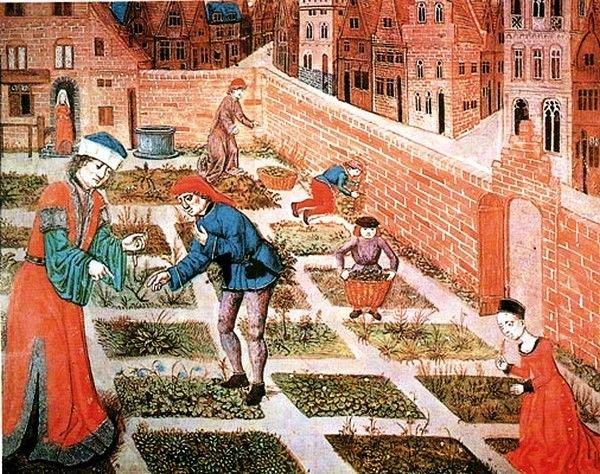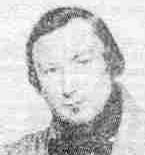Pennherez Ar Wern
La fille unique des Le Guern
The unique heiress to the Le Guerns
Texte recueilli par Jean-Marie de Penguern (1807 - 1856)
Manuscrit coté N.91 à la Bibliothèque NationalePublié par Dastum dans "Dastumad Penwern" en 1983, page 48

Mélodie
Air publié dans "Musiques bretonnes" par Maurice Duhamel
recueilli auprès de Menguy et Léon de Carhaix
Arrangement par Christian Souchon (c) 2008
Source: le site de M.Quentel, "Son ha ton" (voir "Liens")
|
PENN-HEREZ AR WERN Merc'hed yaouank, e gwirionez, 'Med d'unan ma roit promesa! An hini a ro da zaou pe dri A yelo d'an ivern da leskiñ. An hini ro da dri pe bevar A vo daonet heb neb mar, A vo deus Doue distak a-grenn Evel ur skourr deus ur wezenn! ********** En un dont deus al leur nevez, Me oa graet seizh promesa. Seizh promesa am-boa graet Kenkoulz ma bije graet an eizhved. Da zeizh den yaouank am-boa touet Kemerjent ac'hanon 'vit pried. Yann Gornek oa barzh em genou [1] Oc'h ober 'vidon promesaoù. Pa oa gant an hent o voned, Ur c'havalier 'neus rañkontret. - Plac'hik yaouank, din-me larit, Trezeg ped bro 'vel-se ez it? - Me ya bremañ da Wengamp Da brenañ 'n aliañs arc'hant. Ha neuze da brenañ ur ruban: Ganeoc'h, kavalier, zo unan! - Ma ruban ho-po mar karit, Mar karit bezañ va fried. Bezañ gwreg din-me evit mat, Hag hen sinañ din gant ho kwad. Sinañ din gant ur benn-duenn [2] E vefec'h din evit biken. - Plijoud awalc'h ra ho feson: Setu aze va dorn, mignon. Ha dilun gentañ, mar karit, Aotroù kabiten, vo hon eured. Eizh kemener a zo em zi Oc'h ober un habit nevez din. War-c'hoazh, marteze, a vo nav: Red vo d'ho kwreg bezañ faro.- ********** Penn-herez Ar Wern a lare E ger he dous, pa arrue: - Deut ganin, du-mañ d'ar jardin, [3] D'ober ur bouked louzoù fin! - Merc'h yaouank, va eskuzit, D'ar jardin, ganeoc"h me 'n in ket, Rag ar jardin zo benniget Ha c'hwi ha me, n'in ha n'eomp ket: Er jardin zo ul louzaouenn Zo añv Jezuz war he fenn. Añv Jezuz zo war he fenn. Añv Mari war he delienn. [4] ********** - Ma mamm, 'm-eus aon ez-on mañket Kemer hennezh evit pried. E vizaj blij din awalac'h, Med e dreid zo vel treid ur marc'h! [5] - Laret 'm boa deoc'h, va merc'hig koant, Choaz ur pried hervez ho c'hoant. Taolit pled pa choazit unan Ho kasfe da loskañ d'an tan. - ********** Paz antreent dre an nor vras, An dud a eured a oa flamm-bras; Dre m'antreent barzh an iliz Teue 'n o c'herc'henn ur vrumenn vrizh. 'Benn arrujent d'ar balustroù E oent o daou du evel glaou. Ar beleg yaouank a c'houlenne D'ar benn-herez Ar Wern, neuze: - Merc'heg yaouank, din-me larit, Petra ganeoc'h zo arruet? Petra ganeoc'h zo arruet? Du ho kavan, vel ar pec'hed. - Beleg yaouank, mar em c'harit Ar stoll em c'herc'henn a lakfec'h: Me zant er verv barzh em eskern 'Meus aoñ ez on o vont d'an ivern. Me zant an tan em daoulagad Ez on da deviñ kig ha gwad! - N'oa ket he gir peurechuet: An douar d'he treid zo digoret. Seizh lev tro-war-dro a oe klevet Gant un drouz efroyab meurbed Oe klevet penn-herez Ar Wern O kouezhañ 'n foñs puñs an ifern. Transcription KLT: Chr.Souchon (c) 2012 |
LA FILLE UNIQUE DES LE GUERN Jeunes filles, ah oui, vraiment, Fiancez-vous à bon escient! Fiancez-vous deux ou trois fois: Vous irez en enfer tout droit. Et, si vous allez jusqu'à quatre: La damnation! Rien à débattre! De Dieu vous serez éloignées Comme d'arbre branche coupée! ********** En revenant d'une aire neuve, Où sept fois j'avais fait la preuve Que jurer n'est pas un dilemme, Pas plus, d'ailleurs, que la huitième, A sept jeunes gens engagée A devenir leur épousée, Car, en ma bouche ayant pris place, Le Cornu parlait à ma place; [1] J'allais donc, et j'ai rencontré Sur le chemin un cavalier. Lequel me dit: - Jeune fillette, Où donc vous rendez-vous, seulette? - De ce pas, je vais à Guingamp Acheter un anneau d'argent. Ainsi qu'un beau ruban, ma foi, Cavalier, tel que celui-là! - Vous l'aurez si vous y tenez Et consentez à m'épouser, A signer votre engagement D'être mienne éternellement Avec un roseau, noir devant, [2] Ainsi qu'une goutte de sang! - Ceci n'est pas pour me déplaire. C'est ma main: je me laisse faire. Lundi, la semaine prochaine, Marions-nous, beau capitaine! Huit tailleurs s'affairent chez moi A coudre un habit d'apparat, Et, sait-on jamais, neuf demain: Car votre épouse le vaut bien!- ********** La jeune Le Guern s'est rendue Chez cet homme dans la grand' rue: - Avec moi, venez au jardin, [3] Pour y cueillir du romarin! - Fillette, vous m'excuserez, Au jardin je ne puis aller. Car ce jardin, il est béni. A nous deux il est interdit: Il est une herbe en ce courtil Où le mot "Jésus" est inscrit "Jésus" sur la fleur épanouie Et sur la feuille on lit "Marie". [4] ********** - Maman, j'ai peur d'avoir choisi A mauvais escient mon mari. Beau de visage et sculptural, Mais ses pieds sont ceux d'un cheval! [5] - Je t'ai répété cette antienne: "Prends un époux qui te convienne, Mais ne choisis pas un pervers Qui te conduirait en enfer!" - ********** Quand sous le porche ils ont passé,, Ils semblaient un couple parfait! Mais lorsqu'ils entrent dans l'église, C'est voilés d'une brume grise. Quand à l'autel ils s'agenouillent Ils sont noirs comme de la houille. Le jeune prêtre demandait A la jeune fille, angoissé: - Jeune fille, je suis inquiet. Que vous est-il donc arrivé? Dites-moi donc ce qui vous fait Aussi noire que le péché. - Jeune prêtre, voudriez-vous Passer votre étole à mon cou: Je sens bouillir la moëlle en moi C'est l'en enfer qui m'attend, je crois. Le feu que dans mes yeux je sens Va brûler ma chair et mon sang! - Elle n'avait pas achevé Que le sol s'ouvrit sous ses pieds. A sept lieues à la ronde un bruit Effroyable se répandit: Elle tombe en l'abîme ouvert: C'est, hélas, le puits de l'enfer. Trad. Christian Souchon (c) 2012 |
THE UNIQUE HEIRESS TO THE LE GUERNS Girls, in truth I say to you all, There is only one betrothal! Should you get twice or thrice engaged The fire of hell would be your wage. Whoever was three or four times Is damned forever for these crimes And as far from Heaven will be As are dead branches from a tree. ********** I came from a new threshing floor Engaged seven times, if not more, To seven boys I was engaged - My thirst was not yet assuaged - To be for the rest of my life To each of them, a loving wife. Through my mouth Horned Johnny spoke, [1] Made promises by way of joke. I was on my way: drawing near Was suddenly a cavalier - Whither are you going alone? He asked me in a mellow tone. - It's to Guingamp town I repair A gold wedding ring to buy there, And a ribbon for my wedding Quite like the one you are wearing! - You may have it, if to my house You follow me to be my spouse. To be my spouse, quite in earnest, You'll sign with your blood, my dearest. In your blood just dip a reed quill: [2] Forever you'll be mine, you will! - I don't dislike your off-hand ways Here is my hand for blood to graze. And next Monday, if you agree, Dear captain, our wedding will be. I have kept eight tailors busy Making gowns for me already. Tomorrow, maybe there'll be nine: Your affianced bride must look fine! - ********** The heiress, who her lover led, On entering his dwelling, said: - What about going to the yard [3] To pick rosemary and spikenard? I'm sorry to displease you. Though, With you to this yard I won't go. For this is a blessed garden, To you and to me forbidden. It harbours a plant with the name Of Jesus inscribed on its frame. The name of Jesus, on its crown And that of Mary further down. [4] ********** - Mother, the wrong husband I took: The one I have begins to spook I find his face very lovely, But his horse's feet quite ugly! [5] I told you oft dear daughter, to Choose a husband who pleases you, But don't choose any, mind it well, Who would send you to burn in hell. - ********** When they entered the high church porch, They were bright as a flaming torch; But when they entered the church hall A motley haze had wrapped them all. And when they reached the balustrade They were hued in charcoal dark shade. The young priest asked the heiress Whose expression was so helpless: - Young girl, young girl, tell me, would you? Would you tell what happened to you? What happened? What has made your skin, As all can see, as dark as sin? - O young priest, on me have pity! Round my neck lay your stole quickly! The marrow boils within my bones! Each of them for fear of Hell groans! The fire of Hell that irks my eyes To burn my flesh and blood will rise! - Her speech would never be complete: The earth opened under her feet. Seven leagues all around was heard A horrid noise and all were stirred: 'T was the heiress Le Guern who fell With a yell down the well of Hell! Transl. Christian Souchon (c) 2012 |
